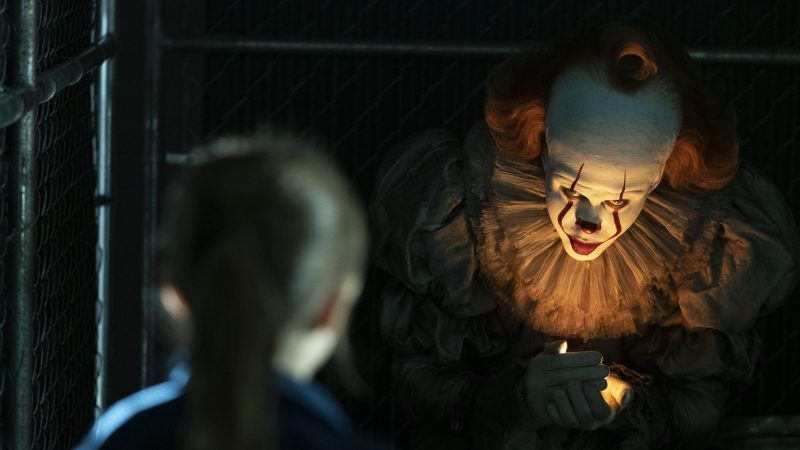Review: It Chapter Two
Bill Hader and Jessica Chastain in a very long and crowded horror sequel.

The best kind of monster, of course, is one that's little-seen. Steven Spielberg demonstrated this in Jaws, when he famously had to find a way to not show too much of his crappy looking shark. And just a few months ago Ridley Scott, the director of Alien, told the trade mag Variety, "You don't show the monster too many times because you'll get used to him and you never want to get used to him—ever. The best screening room in the world is the space between your ears…your brain."
I'm not sure Andy Muschietti got this memo. Not recently, anyway. Muschietti's 2017 film It, his excellent adaptation of about half of Stephen King's 1986 novel, was a model of monster economy. The director deployed his killer clown, Pennywise (Bill Skarsgård), in scenes carefully shaped for maximum terror – but also gave him bench time whenever gentler, more Spielbergian concerns had to be given play. In the new It Chapter Two, however, the bulb-headed freak is everywhere. After the first hour— and this is a movie that runs nearly three hours—he starts to wear out his welcome. Horrible stuff keeps happening, but inevitably monotony sets in, and by the end you're gasping for fresh invention. (This is the kind of movie in which the camera angles generally tip you off that something appalling is about to happen, usually in the background of a shot.)
Okay, it's hard to adapt an 1100-page novel. But here, even with stuff left out (for fans to gripe about), it still feels like too much has been left in. First of all, the cast is now a crowd. The story begins with the final scene in the previous film, set in the late 1980s, in which the young members of the Losers' Club, having dispatched Pennywise at least temporarily, vow to come back to their hometown of Derry, Maine, and fight him anew if he ever returns. When he does (it happens every 27 years), and children start to go missing again, Mike Hanlon (Isaiah Mustafa)—the only member of the club who's remained in Derry—puts in a call to each of his onetime fellow Losers, now all grown up and scattered.
Stuttery Bill Denbrough, for example, has become a successful author (and is now played by James McAvoy). Bill's long-ago crush Beverly Marsh (Jessica Chastain) is a fashion designer married to a guy who beats her. Wise guy Richie Tozier (Bill Hader) has become, unsurprisingly, a standup comic. Tightly wound hypochondriac Eddie (James Ransone) works for an insurance company. And once-chubby Ben (Jay Ryan), now an architect, has dropped much childhood weight and currently resembles an Athenian deity. ("You look amazing," says Richie. "What the fuck happened?") Then there's troubled Stanley Uris (Andy Bean)—let's say he's still troubled.
Most of the Losers heed Mike's rallying call and make the trip home to Derry, where they gather at a Chinese restaurant for a gaudy gross-out scene (there are some very yucky things on the menu). Before long the original kids from the first movie—Sophia Lillis, Finn Wolfhard, Jeremy Ray Taylor, et al.—start weighing in as well, in a steady procession of '80s flashbacks. This makes for a certain degree of narrative clutter. And when it is decided that the group should not stick together in pursuit of the fear-savoring Pennywise, but should instead split up and face their own fears separately, the movie begins to bog down seriously.
There are gripping stretches, of course: the sight of a demented clown biting into someone's chest or chewing off someone's face is naturally entertaining. And the long scene in which grown-up Beverly pays a visit to a majorly strange old woman is a terror classic—too bad it was already released almost in its entirety in a trailer last spring.
The actors, both young and old, make quite a bit of the movie worth watching. (Bill Hader is so sharp that there's already been Oscar talk about his performance—even though he's given more to work with on any random episode of his HBO show Barry than he gets here.) But the picture is crippled by its inordinate length, a problem swollen by its time-sucking search for a solid ending. (Ironically, a recurrent theme in the film is the lousy endings of Bill Denbrough's books—a charge driven home in a meta way at one point by a cameoing Stephen King himself.) The story has no tension because we know what has to happen—the Losers have to triumph over Pennywise once again. And no matter how bloated the digital effects become—and they become hugely bloated, with Pennywise swelling up to the size of a small building in a conclusion that feels like it'll never, ever end—they stir no awe…only a desire to be done with this thing, and then gone.